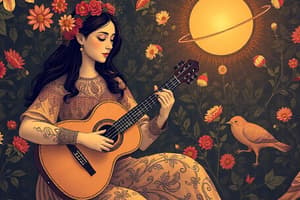Podcast
Questions and Answers
In which century did Flamenco originate in the Andalusia region of Spain?
In which century did Flamenco originate in the Andalusia region of Spain?
- 19th century
- 17th century
- 18th century (correct)
- 20th century
Which of the following cultural influences did not contribute to the development of Flamenco?
Which of the following cultural influences did not contribute to the development of Flamenco?
- French folk music (correct)
- Gitano culture and music
- African rhythms and percussion
- Andalusian folk music
What is the period known as the Golden Age of Flamenco?
What is the period known as the Golden Age of Flamenco?
- The late 20th and early 21st centuries
- The mid-19th century
- The late 19th and early 20th centuries (correct)
- The late 17th and early 18th centuries
What type of social gathering places were often associated with Flamenco performances?
What type of social gathering places were often associated with Flamenco performances?
Which of the following Flamenco styles is characterized by intense passion and energy?
Which of the following Flamenco styles is characterized by intense passion and energy?
Who is considered one of the greatest Flamenco singers of all time?
Who is considered one of the greatest Flamenco singers of all time?
Flashcards are hidden until you start studying
Study Notes
Flamenco History
- Origins: Flamenco originated in the Andalusia region of Spain, particularly in the provinces of Seville, Cádiz, and Granada, in the 18th century.
- Influences:
- Gitano (Roma) culture and music
- Andalusian folk music
- Moorish and Arabic music
- African rhythms and percussion
- Golden Age: The late 19th and early 20th centuries are considered the Golden Age of Flamenco, with legendary performers such as Silverio Franconetti and El Planeta.
- Café Cantante: Flamenco was often performed in Café Cantantes, social gathering places where musicians would perform and improvise.
- Flamenco styles:
- Primitivo: Early, raw, and emotive style
- Andaluz: More refined and elegant style
- Gitano: Style characterized by intense passion and energy
- Famous Flamenco artists:
- Camarón de la Isla: Considered one of the greatest Flamenco singers of all time
- Paco de Lucía: Renowned Flamenco guitarist and composer
- Cristina Hoyos: Dancer and choreographer who helped popularize Flamenco internationally
- Flamenco's evolution: Flamenco has continued to evolve, incorporating new influences and styles, while remaining true to its roots and essence.
Studying That Suits You
Use AI to generate personalized quizzes and flashcards to suit your learning preferences.




